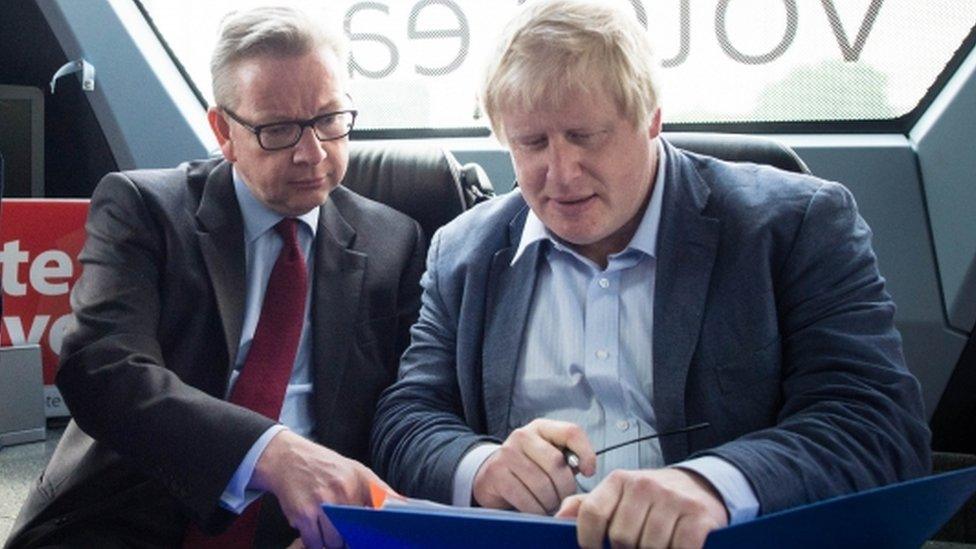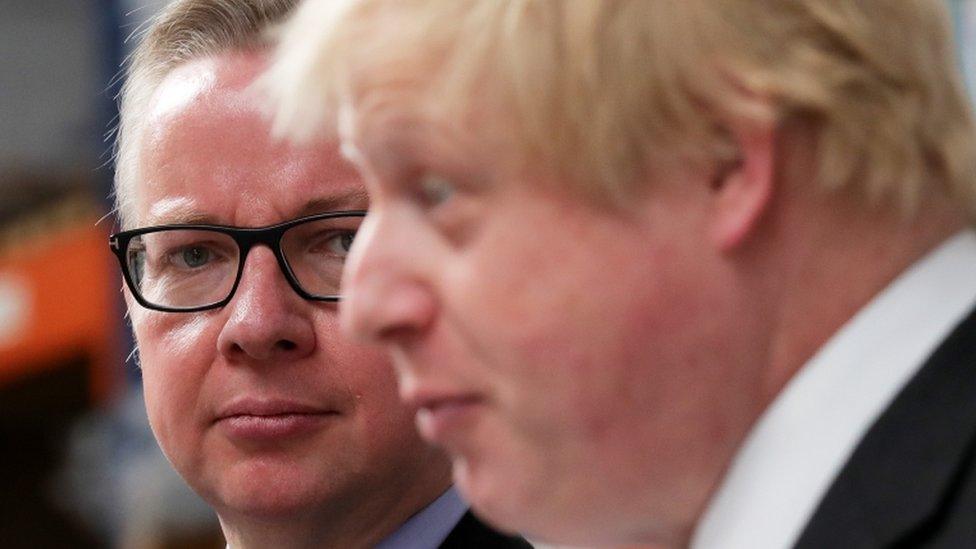Michael Gove: Boris Johnson wasn't up to the job
- Published
Michael Gove on why he decided that: "I should stand and Boris should stand aside"
Michael Gove has said he chose to run for the Conservative Party leadership after deciding "reluctantly but firmly" that Boris Johnson was not capable of uniting the party or the country.
"It had to fall to someone else... I felt it had to fall to me," he said.
The justice secretary was set to back his fellow Leave campaigner. Mr Johnson pulled out after Mr Gove's switch.
Home Secretary Theresa May, who backed staying in the EU, is favourite to win the contest and become prime minister.
The other contenders are Work and Pensions Secretary Stephen Crabb, who backed Remain, former defence secretary Liam Fox, who backed leaving the EU, and energy minister and Leave campaigner Andrea Leadsom.
Nominations for the Conservative Party leadership closed at midday on Thursday.
The winner of the contest - sparked by David Cameron's decision to resign after the UK voted to leave the EU - is set to be announced on 9 September.
Mr Gove's decision to run for the leadership and Mr Johnson's subsequent decision to bow out of the contest sent shockwaves through the political world in a day of high drama.
In an interview with the BBC political editor Laura Kuenssberg, Mr Gove, explaining his reasons for standing, said following last week's Brexit result he felt the country needed a leader "who believed heart and soul in leaving the European Union".
"I also believed we needed someone who would be able to build a team, lead and unite. I hoped that person would be Boris Johnson," he said.
But he added: "I came in the last few days, reluctantly and firmly, to the conclusion that while Boris has great attributes he was not capable of uniting that team and leading the party and the country in the way that I would have hoped."
In full: Michael Gove's 16 minute interview with Laura Kuenssberg
Mr Gove said he had only decided to run for the leadership late on Wednesday evening, and was still to speak to Mr Johnson about his decision.
He rejected as "just not true" accusations from Mr Johnson's supporters that he had betrayed the former London mayor by deciding to stand for leader, rather than throw his weight behind him.
He said he had been "trying hard to persuade" Conservative MPs over the course of the week that Mr Johnson was the right candidate to be leader but after reflecting on conversations with colleagues "I realised it was not going to work".
"So I tried as hard as I could but last night, reflecting on this, I came to the conclusion that ultimately Boris could not build that team, could not provide that leadership and that unity.
"It had to fall to someone else. As someone who had argued consistently that we should leave the European Union, and as someone who's experienced at the highest levels in the Cabinet, I felt it had to fall to me," he said.

Mr Gove and Mr Johnson campaigned side by side during the referendum campaign
Mr Gove - who along with Mr Johnson was a prominent figure in the Leave campaign - also confirmed he had not discussed his decision with Chancellor George Osborne.
Echoing arguments he made during the EU referendum campaign, he said he would work to bring down immigration outside the EU to a "manageable" level, built on an Australian points-style system.
"I'll negotiate with toughness, and with great attention to detail to get the best possible deal for Britain. It's only when we are outside the European Union that we can at last bring those numbers under control in the way that the public want," he said.
Setting out his Brexit plan, Mr Gove said he would not trigger Article 50 - the formal process for leaving the EU - until he was ready to do so.
"The decision to trigger Article 50 is in the hands of the next prime minister. If that is me, I will make a judgement as to when is right for Britain and I won't be hurried or hassled by anyone into pressing that button or triggering that article until I believe it is right for this country," he said.
- Published30 June 2016
